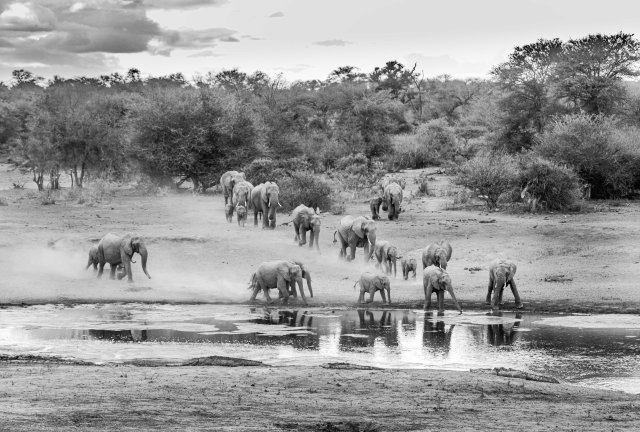The presentation was about to begin.
It was a dark night. Most attendees could not see. But this did not concern them since they had all got used to the dark which descended, whenever their so called leader delivered his rambling, nonsensical monologue. It was all too familiar. It was all so predictable. There was little or no intellectual foundation to anything that he said.
Most attendees were comfortable not to see. In fact, behind closed doors in private conversations, it was unanimously agreed that it was preferable not to look, since not looking would prevent seeing, which in a weird sort of way, could pardon them from taking on any responsibility for not challenging any comment, statement and decision that he may make. Further, not being able to see could be used as an excuse of that ‘we didn’t know’ when they would eventually be confronted with, sometime in the future, all of the evidence that revealed the incompetence, greed, narcissism and fear-mongering of their Destroyer-in-Chief.

Tonight, nature was not playing its part. The clouds lifted (much like curtains do at the beginning of a show), to reveal beautiful, refreshing light that radiated from the moon at the very moment that he uttered his first word.
‘I will keep you safe, I will protect you’, promised the Destroyer. ‘I have been your omega and saviour for four years, and now more than ever before, there is more need for me to keep you safe. The world is a dangerous place. There are internal and external threats that only I can protect you from’.
He had mastered the tactic of intensifying fear, as a way to hold onto his power and authority. It was a common tactic that all dictators used.
‘I have done a great job. Look at how well we are doing, I have created a nirvana where everyone is prospering. The numbers are great.’
He was a master of arrogance and ‘big talk’. His speech was vague, littered with sweeping generalizations so that he could create false verbal realities that in no way matched the reality that people were actually experiencing. There was such a disconnect.
Hours passed as the Divider-in-Chief ranted and raved. He had a captured audience for his one-man show; an audience that dared not utter a word, ask a question or disagree with anything that was said. But this was all too familiar – most of the crowd had ‘clocked out’, with eyes closed and voices silent.
During one of the rare moments when he paused, a courageous voice asked a question. It was not a confident voice, but it shocked the sleepy audience out of their slumber. They all knew that the wrath of the Destroyer would soon be unleashed. He was a master of twisting information around, of undermining and belittling any ideas or questions that were not in agreement with his.
‘But sir don’t you see the paradox?’
The question was asked respectfully but it riled the Destroyer. He demanded total allegiance and loyalty from everyone, not only from his sleepy audience. How dare anyone question his authority? He had already told everyone that he was a genius so why did this punk not listen?
‘That’s a nasty question, and you are a stupid person’, attacked the Destroyer. He was a master of intimidating tactics that unbalanced any opponent in front of others.
But this was no ordinary person who had posed the question. He was a tai chi master, who understood the nature of energy flow and the power of having a gentle, loving attitude to all things that he encountered. He was an integrative thinker, who understood the complexity of diverse ecological systems.
He stood in silence looking directly into the eyes of the Divider-in-Chief. He radiated energy that unnerved the Destroyer, who was still trying to make intellectual sense of the question that had been posed.

‘Don’t you see the paradox that totally undermines and destroys everything you say? And in the process, it will ultimately destroy you?’
Confusion reigned in the mind of the Disrupter-in-Chief. For the first time, he was now encountering a tai chi master who was skilled in the power of reflection.
‘Who has caused or is responsible for the turmoil that exists at present, which has unfolded on your watch over the past four years? Why do you escape into the future by creating more fear in the present so that you can promise to rescue the future, given the turmoil and chaos that exists in the present. How can you simultaneously be the savior and solver of future destruction, when in fact you are the source and the creator of present chaos?’
‘It is impossible for you to solve the very problems that you have created, unless of course you don’t believe that you have caused any of the chaos that presently exists in our country?
‘I have done a great job’, countered the Destroyer.
‘And therein lies the problem that prevents you from seeing the paradox’, concluded the master.







